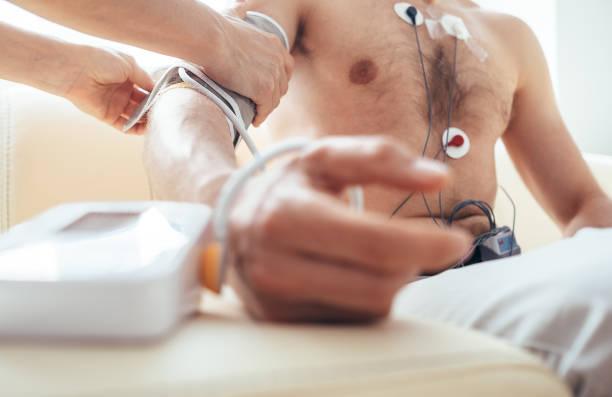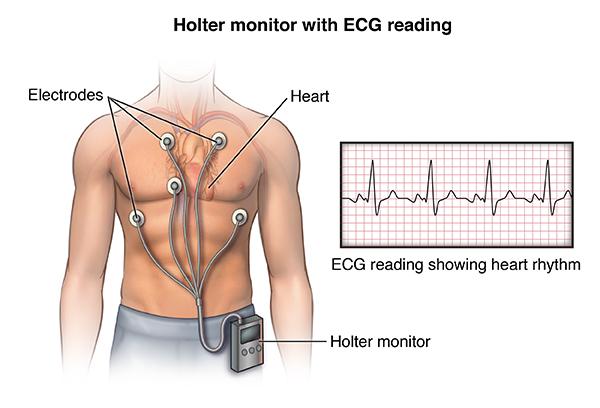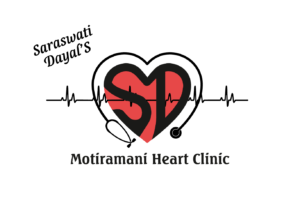Holter Study
Saraswati Dayal’s Motiramani Heart Clinic is one of the most trusted Holter Study Test Centers in Shankar Nagar, Raipur Chhattisgarh, India.

The Holter monitor is a type of portable electrocardiogram (ECG). It records the electrical activity of the heart continuously over 24 hours or longer while you are away from the doctor’s office. A standard or “resting” ECG is one of the simplest and fastest tests used to evaluate the heart. Electrodes (small, plastic patches that stick to the skin) are placed at certain points on the chest and abdomen. The electrodes are connected to an ECG machine by wires. Then, the electrical activity of the heart can be measured, recorded, and printed. No electricity is sent into the body.
Natural electrical impulses coordinate contractions of the different parts of the heart. This keeps blood flowing the way it should. An ECG records these impulses to show how fast the heart is beating, the rhythm of the heart beats (steady or irregular), and the strength and timing of the electrical impulses. Changes in an ECG can be a sign of many heart-related conditions.

Our Cardiologist provider may request a Holter monitor ECG if you have symptoms, such as dizziness, fainting, low blood pressure, ongoing fatigue (tiredness), and palpitations and a resting ECG doesn’t show a clear cause. You wear the same kind of ECG electrode patches on your chest, and the electrodes are connected by wires to a small, portable recording device.
Certain arrhythmias (abnormal heart rhythms) may occur only now and then. Or, they may occur only under certain conditions, such as stress or activity. Arrhythmias of this type are hard to record on an ECG done in the office. Because of this, the healthcare provider might request a Holter monitor to get a better chance of capturing any abnormal heartbeats or rhythms that may be causing the symptoms. Some Holter monitors also have an event monitor feature that you activate when you notice symptoms.
You will get instructions on how long you will need to wear the monitor (usually 24 to 48 hours), how to keep a diary of your activities and symptoms during the test, and personal care and activity instructions, which include keeping the device dry while you are wearing it.
Why might I need a Holter monitor?
A Cardiologist may recommend a Holter monitor if you have:
- Signs and symptoms of an irregular heart rhythm (arrhythmia)
- Unexplained fainting
- A heart condition that increases the risk of arrhythmias
- To evaluate chest pain that can’t be reproduced with exercise testing
- To determine how well treatment for complex arrhythmias is working
What happens during a Holter monitor?
A Holter monitor recording is generally done on an outpatient basis. Procedures may vary depending on your condition and your healthcare providers practice.
Generally, a Holter monitor recording follows this process:
- You will be asked to remove any jewelry or other objects that may interfere with the reading.
- You will be asked to remove your clothing from the waist up so that electrodes can be attached to your chest. The technician will ensure your privacy by covering you with a sheet or gown and exposing only the necessary skin.
- The areas where the electrodes patches are placed are cleaned, and in some cases, hair may be shaved or clipped so that the electrodes will stick closely to the skin.
- Electrodes will be attached to your chest and abdomen. The Holter monitor will be connected to the electrodes with wires. The small monitor box may be worn over your shoulder like a shoulder bag, around your waist, or it may clip to a belt or pocket.
- Find out if you will have to change the batteries in the monitor. Be sure you know how to do it and have extra batteries on hand.
- Once you have been hooked up to the monitor and given instructions, you can return to your usual activities, such as work, household chores, and exercise, unless your healthcare provider tells you otherwise. This will allow your healthcare provider to identify problems that may only occur with certain activities.
- You will be instructed to keep a diary of your activities while wearing the monitor. Write down the date and time of your activities, particularly if any symptoms, such as dizziness, palpitations, chest pain, or other previously experienced symptoms, occur.
What happens after a Holter monitor?
You should be able to go back your normal diet and activities, unless your healthcare provider instructs you differently.
Generally, there is no special care after a Holter monitor recording.
Tell your healthcare provider if you develop any signs or symptoms you had before the recording (for example, chest pain, shortness of breath, dizziness, or fainting).
Your healthcare provider may give you other instructions after the procedure, depending on your particular situation.
